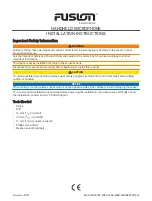
1
CADLive
TM
WX3000
Introduction
CADLive
TM
is designed to outperform your expectations and deliver
exceptional performance. Engineered to compliment the new
generation of exceptional sound systems - The CADLive Series taps our
Equitek studio heritage along with our live sound know-how in creating
an impactful and easy-to-use line of mics.
The CADLive 3000 series feature True Diversity operation to minimize
multipath interference along with CADLock™ Automatic Tone Encoded
Squelch to eliminate unauthorized transmissions in the signal path.
Frequency agile design when partnered with ScanLink™ technology will
precisely scan, select and link to the optimum channel allowing for an
easy, flexible frequency plan.
The CADLive handheld transmitter features metal construction and
the CADLive D90 Supercardioid dynamic capsule provides a powerful,
smooth and highly articulate profile. The handheld and body pack
transmitters also include SoftTouch™ multi-function On-Off/Mute
switches. CADLive bodypack transmitters are equipped with CADTone™
circuitry ensuring accurate reproduction of Hi-Z guitar and Lo-Z mic
inputs.
CADLive wireless features 10, 30, 50mW transmitter power adjustment
and dynamic range up to 110dB. Receivers and transmitters are
equipped with a high definition LCD display and full RF, AF, Battery Life,
Mic Sensitivity and RF power metering.
Receivers are housed in an all-metal chassis and supplied with single/
dual rack ears and a BNC relocation kit. Body pack systems include
Equitek E19 earworn and E29 lavalier mics. Both systems are supplied
with a heavy-duty carry case.
The CADLive
TM
WX3000 includes the following features:
• True Diversity to minimize multipath interference
• CADLock™ Automatic Tone Encoded Squelch eliminates
unauthorized
interference
• Frequency agile operation for maximum frequency plan flexibility
• ScanLink™ technology for instantaneous and automatic
channel
configuration
• CADTone™ Body Pack input – Optimized Impedance interface -
Hi-Z for Guitar and Lo-Z for mic
• Metal construction Handheld Transmitter equipped with
CADLive™ D90
capsule
• High Contrast LCD displays on TX and RX
• Transmitters feature 10, 30, 50mW power adjustment to aid
in multiple system applications
Individuals with cardiac pacemakers and other similar medical devices
should consult with their physician before using any RF devices.
Though the output level of this wireless system is below 50 milliwatts,
the proximity of the transmitter to the implant device could pose a threat.
As with any wireless product, environmental conditions can reduce or
in some cases prohibit a successful connection between the transmitter
and the receiver.
This device complies with Part 15 of the FCC Rules. Most users of
CAD Audio wireless products in the United States do not need a license
for operation. However, the rules for unlicensed operation state that
this device must not operate in excess of 50 milliwatts and it must not
cause harmful interference to other wireless devices, and must accept
interference received from other devices. Wireless products meeting
CAD factory standards adhere to these rules. The FCC reserves the right
to change these rules at any time. For more information contact the
FCC at 1-888-CALL-FCC (TTY: 1-888-TELL-FCC) or visit the FCC’s wireless
microphone website at:
www.fcc.gov/cgb/wirelessmicrophones
This device complies with Industry Canada licence-exempt RSS
standard(s). Operation is subject to the following two conditions: (1) this
device may not cause interference, and (2) this device must accept any
interference, including interference that may cause undesired operation
of the device.
Under Industry Canada regulations, this radio transmitter may only
operate using an antenna of a type and maximum (or lesser) gain
approved for the transmitter by Industry Canada. To reduce potential
radio interference to other users, the antenna type and its gain should
be so chosen that the equivalent isotropically radiated power (e.i.r.p.) is
not more than that necessary for successful communication.
Conformément à la réglementation d’Industrie Canada, le présent
émetteur radio peut fonctionner avec une antenne d’un type et d’un
gain maximal (ou inférieur) approuvé pour l’émetteur par Industrie
Canada. Dans le but de réduire les risques de brouillage radioélectrique
à l’intention des autres utilisateurs, il faut choisir le type d’antenne
et son gain de sorte que la puissance isotrope rayonnée équivalente
(p.i.r.e.) ne dépasse pas l’intensité nécessaire à l’établissement d’une
communication satisfaisante.
Le présent appareil est conforme aux CNR d’Industrie Canada
applicables aux appareils radio exempts de licence. L’exploitation est
autoris é e aux deux conditions suivantes : (1) l’appareil ne doit pas
produire de brouillage, et (2) l’utilisateur de l’appareil doit accepter tout
brouillage radioélectrique subi, même si le brouillage est susceptible
d’en compromettre le fonctionnement.
10

























